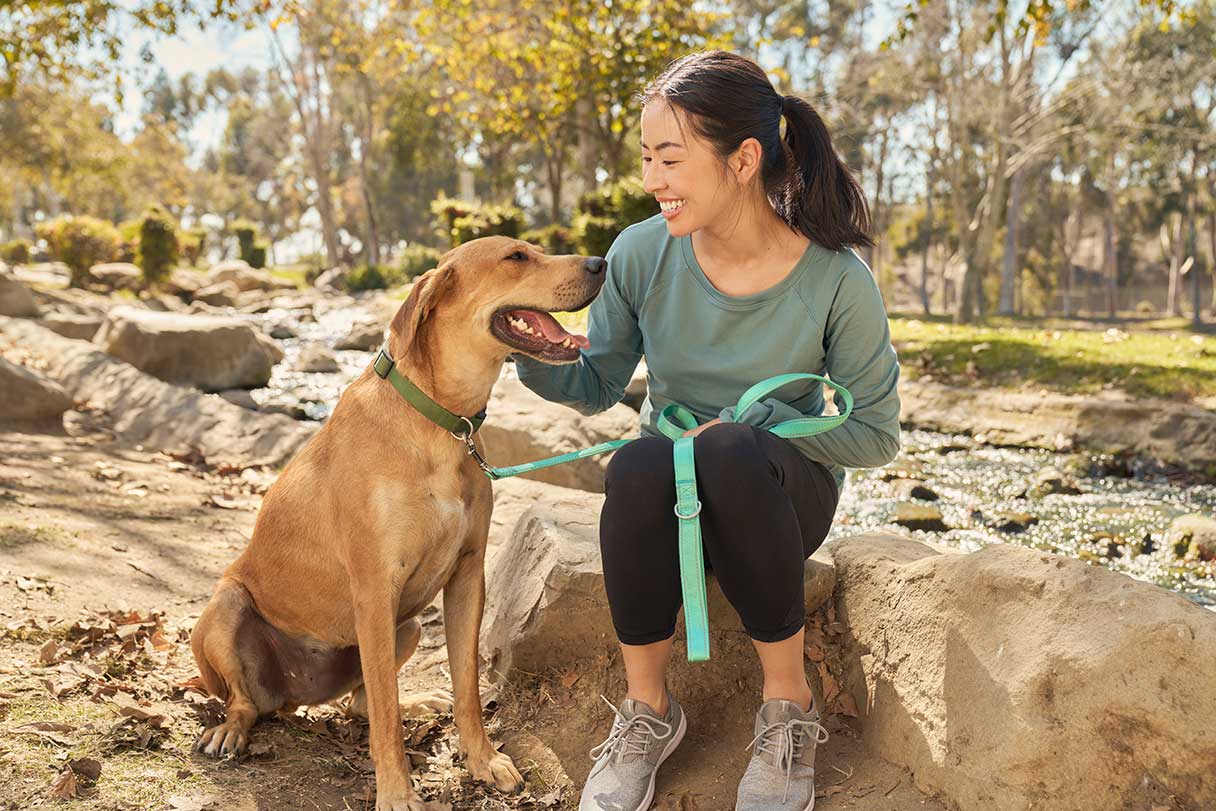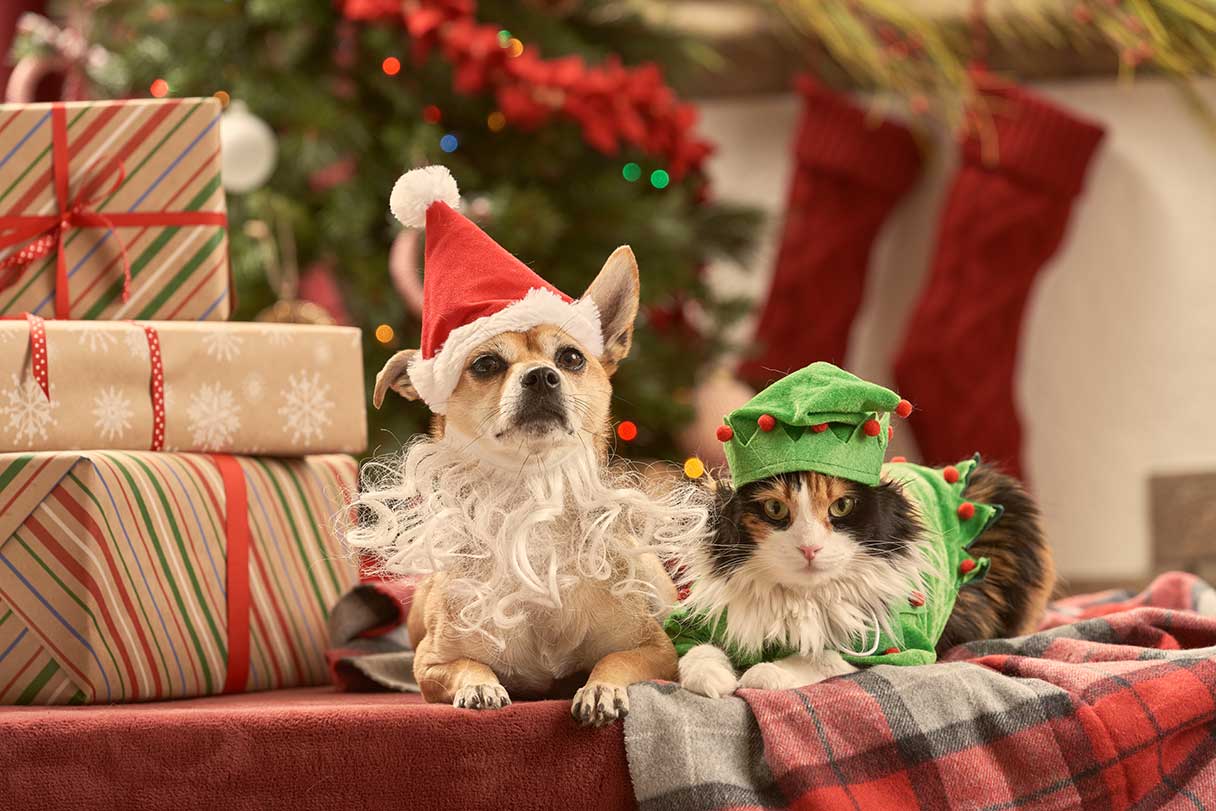As pet owners, we’re well aware that our furry family members are naturally curious and often sniff, chew and even eat things they find lying on the ground, both inside and outside. Unfortunately, many everyday items that we might not think twice about can be hazardous to pets and cause them to become sick, or worse.
Below are 92 common items often found in or around the house — from the kitchen and bathroom to the garage and backyard — that can be poisonous to your pet if ingested.
Foods That Are Toxic to Pets
The following foods and ingredients are toxic to dogs and cats:1
| Type of food |
|---|
| Alcoholic beverages and hops |
| Apple seeds |
| Apricot pits |
| Avocados |
| Bread dough with yeast |
| Cherry pits |
| Chives |
| Chocolate |
| Citrus (stems, leaves, peels, fruit and seeds contain varying amounts of citric acid; small doses may cause only minor stomach upset)2 |
| Coffee (grounds and beans) |
| Garlic |
| Grapes and raisins |
| Gum |
| Leeks3 |
| Macadamia nuts |
| Milk and dairy (can cause stomach upset)2 |
| Mint3 |
| Mushrooms |
| Mustard seeds |
| Nutmeg4 |
| Nuts (almonds, pecans and walnuts)2 |
| Onions (flakes, powder and the whole vegetable) |
| Parsley3 |
| Peach pits |
| Potato leaves and stems |
| Raw or undercooked meat, eggs and bones2 |
| Rhubarb |
| Salt and salty foods |
| Shallots5 |
| Tea (because of the caffeine) |
| Tomatoes (unripened or green fruit, leaves and stems) |
| Xylitol (an artificial sweetener) |
Common Plants That Are Poisonous to Pets
Many plants are harmful because of their essential oils; however, the level of harm varies depending on the specific oil and its concentration. If you use a diffuser, be sure to keep it secured and in a place where your pet cannot knock it over and get essential oils on their body.6
The plants below are toxic to both dogs and cats:3
| Type of plant |
|---|
| Aloe |
| Alocasia |
| Amaryllis |
| American yew |
| Azalea |
| Bay laurel |
| Begonia |
| Bird of paradise |
| Black cherry |
| Buttercup |
| Caladium |
| Carnation |
| Chrysanthemum |
| Clematis |
| Cornstalk plant |
| Cowbane |
| Daffodil |
| Dahlia |
| Daisy |
| Eucalyptus |
| Geranium |
| Holly |
| Hosta |
| Hyacinth |
| Hydrangea |
| Iris |
| Ivy |
| Jade |
| Lavender |
| Lily (all types are toxic to cats, many are also toxic to dogs) |
| Lily of the valley |
| Marijuana |
| Milkweed |
| Mistletoe |
| Monstera |
| Morning glory |
| Mum |
| Nightshade |
| Peony |
| Philodendron |
| Poinsettia |
| Rhododendron |
| Shamrock plant |
| Snake plant |
| Tulip |
| Yarrow |
| Yucca |
Common Chemicals That Are Poisonous to Pets
Several chemicals found in your home and garage are poisonous to pets, including:7
- Antifreeze8
- Cleaning products like laundry detergent and bleach
- Grout (if it contains alkaline corrosive)
- Fabric softener sheets
- Fertilizer with herbicide, insecticide or mold9
- Mosquito repellent
Medications That Are Poisonous to Pets
Medications can be harmful to humans in large or unprescribed doses, and the same applies to our pets. The main medications that are toxic or poisonous to pets are:7
- Adderall
- Aspirin
- Over-the-counter pain medications like ibuprofen and naproxen (NSAIDs)
- Topical creams or ointments
Other Household Items That Are Poisonous to Pets
These items don't fit into any other specific category but can be dangerous to your pet as well:
- Batteries10
- Breath freshener7
- Cigarettes7
Common Symptoms That Your Pet Has Ingested Something Poisonous
Symptoms vary based on what and how much your pet has ingested, but in general, you’ll notice one or more of the following:8
- Diarrhea or blood in the stool
- Vomiting
- Loss of appetite
- Seizures or tremors
- Lethargy or hyperactivity
What Should I Do If My Pet Ingests Something Poisonous?
If you suspect your pet has ingested a toxic substance, contact your veterinarian immediately and/or call the ASPCA’s emergency poison hotline. The hotline is available 24 hours a day, seven days a week (a consultation fee may apply).11 It can be helpful to keep their phone number and your vet's or nearest emergency vet’s information in an easy-to-find spot, such as on your refrigerator.
You shouldn’t induce vomiting in your pet unless instructed by your veterinarian. If your vet recommends doing so, use a 3% hydrogen peroxide solution and follow your vet's instructions on how much to give to your pet (and how often).12
Preventative Tips for Pet Owners
The best thing you can do to prevent your pet from ingesting something toxic is to limit their exposure to the items. Don’t let them get into plants while on walks, and ensure that foods, medications, plants and household items are secured (use childproof locks if necessary) and out of your pets’ reach.13
Here are other poison-prevention tips:13
- Secure trash cans inside and outside to keep them out of pets’ reach.
- Never leave medications uncapped or unsealed, especially when they’re in your purse or on a table.
- Clean up any chemical spills in your garage or yard quickly.
- Keep lawn, garden and automobile chemicals closed and stored on a high shelf.
- Provide your pet with appropriate chew toys and treats to help prevent them from chewing on other objects.
CareCredit Credit Card Financing for Pets
Taking good care of your pet's well-being from nose to tail is essential. Make sure to stay up to date on their regular checkups at the vet to help keep your pet happy and healthy for a lifetime of love. You can use your CareCredit credit card for pet care throughout the year for routine veterinary services as well as emergencies and surgeries.* Use our Acceptance Locator to find a veterinarian near you that accepts CareCredit.
CareCredit is there for you and your pet every step of the way. Continue your wellness journey by downloading the CareCredit Mobile App to manage your account, find a provider on the go and easily access the Well U blog for more great articles, podcasts and videos.
In addition to pet care, you can also use your CareCredit credit card for dentistry, cosmetic, vision, hearing, health systems, dermatology, pharmacy purchases, spa treatments and so much more within the CareCredit network. How will you invest in your health and wellness next?
Author Bio
Abbie Mood is a freelance writer with more than 15 years of experience. She has worked with clients of all sizes to create compelling content, and she has written for the American Kennel Club, Marriott Bonvoy, Women’s Health Online, Headspace and more.








